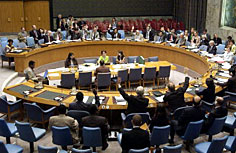North Korean nuclear envoy visits Japan for security conference
North Korea 's chief nuclear negotiator arrived in Japan on Friday to attend a security conference with officials from the five other nations involved in talks on halting the North's nuclear weapons program. The confluence of top officials from the six nations embroiled in the nuclear standoff has raised the possibility of restarting talks stalled since November by a dispute over U.S. restrictions imposed on North Korean companies for alleged illegal financial activities.

Vice Foreign Minister Kim Kye Gwan, who flew to Tokyo via Beijing with other North Korean officials, told reporters in Tokyo he "would not reject" a request for bilateral talks with the U.S. on the sidelines of the conference, according to Kyodo News agency. But the U.S. Embassy said earlier Friday it had no plans at the time for such a meeting.
Japan plans to urge Kim to meet with the U.S. representative, Assistant Secretary of State Christopher Hill, according to news reports, and Japan's top government spokesman has expressed hope that Japanese and North Korean officials will meet on the sidelines. "If there is an opportunity, it is possible that we may meet to discuss issues between Japan and North Korea ," Chief Cabinet Secretary Shinzo Abe said earlier Friday. Prime Minister Junichiro Koizumi said he hoped the conference "would make progress."
The U.S. Embassy announced Tuesday that officials from the six countries the United States , China , Japan , Russia and two Koreas would meet at the privately sponsored security conference in Tokyo on April 10-11. Preliminary meetings for the forum, sponsored by the University of California Institute on Global Conflict and Cooperation, begin April 9.
Also scheduled to attend the Tokyo conference are South Korean Deputy Foreign Minister Chun Young-woo and Japanese Vice Foreign Minister Koji Tsuruoka. Wu Dawei , China 's top nuclear envoy, is scheduled to arrive on Sunday. He will meet delegates to the six-nation talks on the sidelines of the conference but will not attend the meeting, according to the Chinese Foreign Ministry.
Russian Deputy Foreign Minister Alexander Alexeyev may attend the conference, Russian Embassy spokesman Sergei Yasenev said. Alexeyev has been in Japan since Wednesday for previously scheduled talks with Japanese officials, Yasenev said. Last September, the North agreed in the six-party talks to abandon its nuclear program in exchange for aid and security guarantees. Since then, however, no progress has been made on implementing the accord.
In a sign that North Korea may be warming to renewed international dialogue, South Koreas ' Unification Ministry announced Friday that North and South Korea have agreed to restart high-level talks later this month in Pyongyang . The United States, meanwhile, has increased pressure on a Macau-based bank and North Korean companies for alleged involvement in counterfeiting, money laundering and weapons proliferation.
Washington is also preparing to toughen restrictions on North Korean vessels as an additional pressure tactic, Kyodo News agency reported Friday out of Beijing , citing unidentified diplomatic sources. North Korea has denied the U.S. allegations and vowed not to return to the nuclear talks until the sanctions are lifted. The U.S. has refused to lift the penalties, saying they are separate from the arms talks.
Abe said Japan 's focus in possible bilateral talks with North Korea would be resolving a dispute over the past abduction of Japanese nationals by North Korean agents, apparently to train communist spies in Japanese language and customs. North Korea has returned some of the victims, but says the others have died an assertion for which Japan is demanding more proof. North Korea , meanwhile, is demanding that Japan compensate it for ruling the Korean Peninsula as a colony in 1910-45. North Korea declared last year that it has nuclear weapons, although the claim hasn't been independently confirmed, reports the AP.
N.U.
Subscribe to Pravda.Ru Telegram channel, Facebook, RSS!


